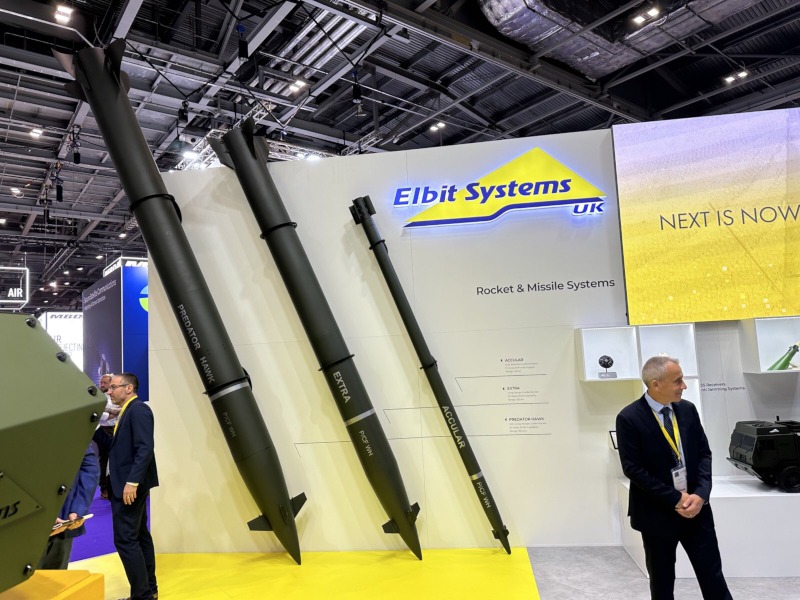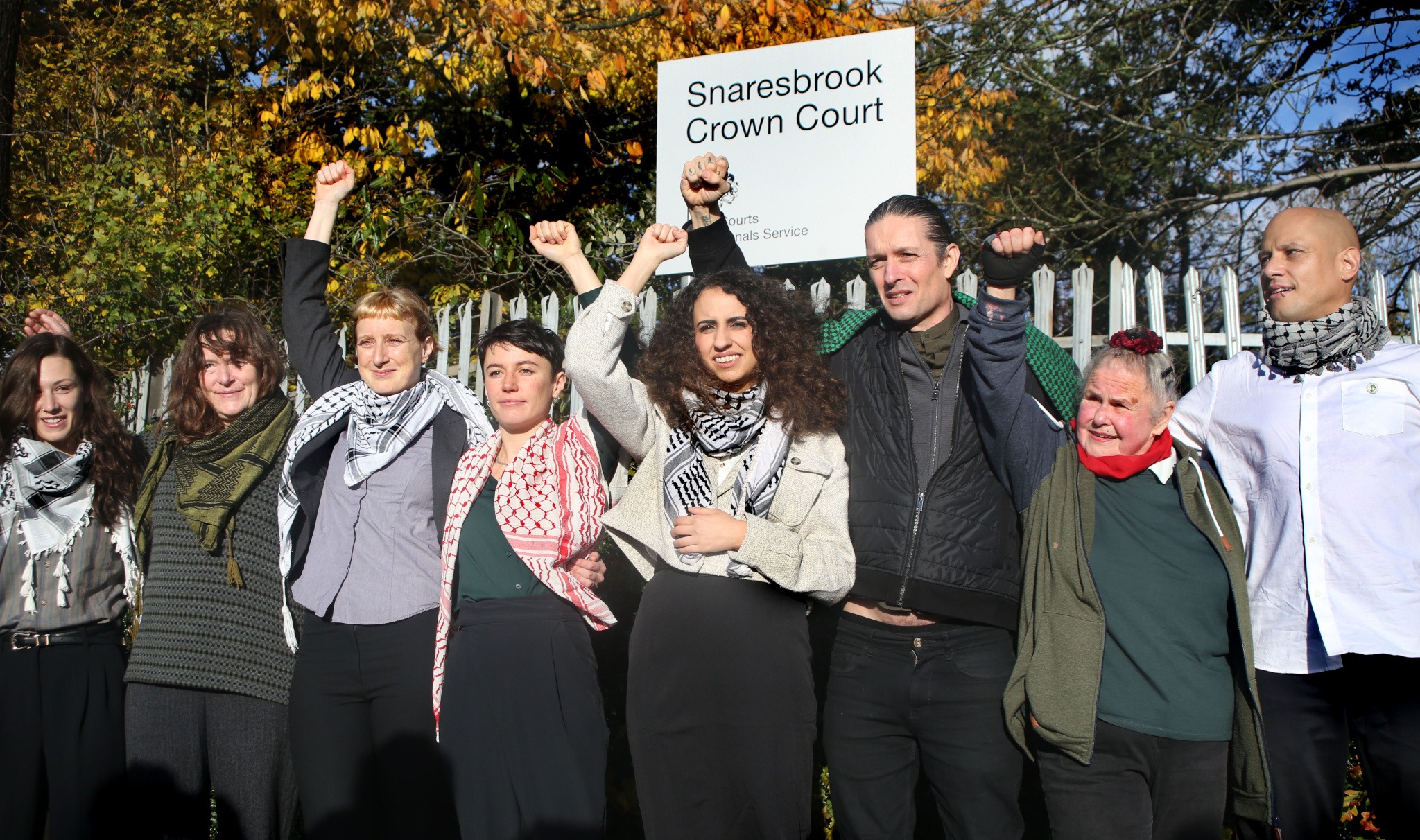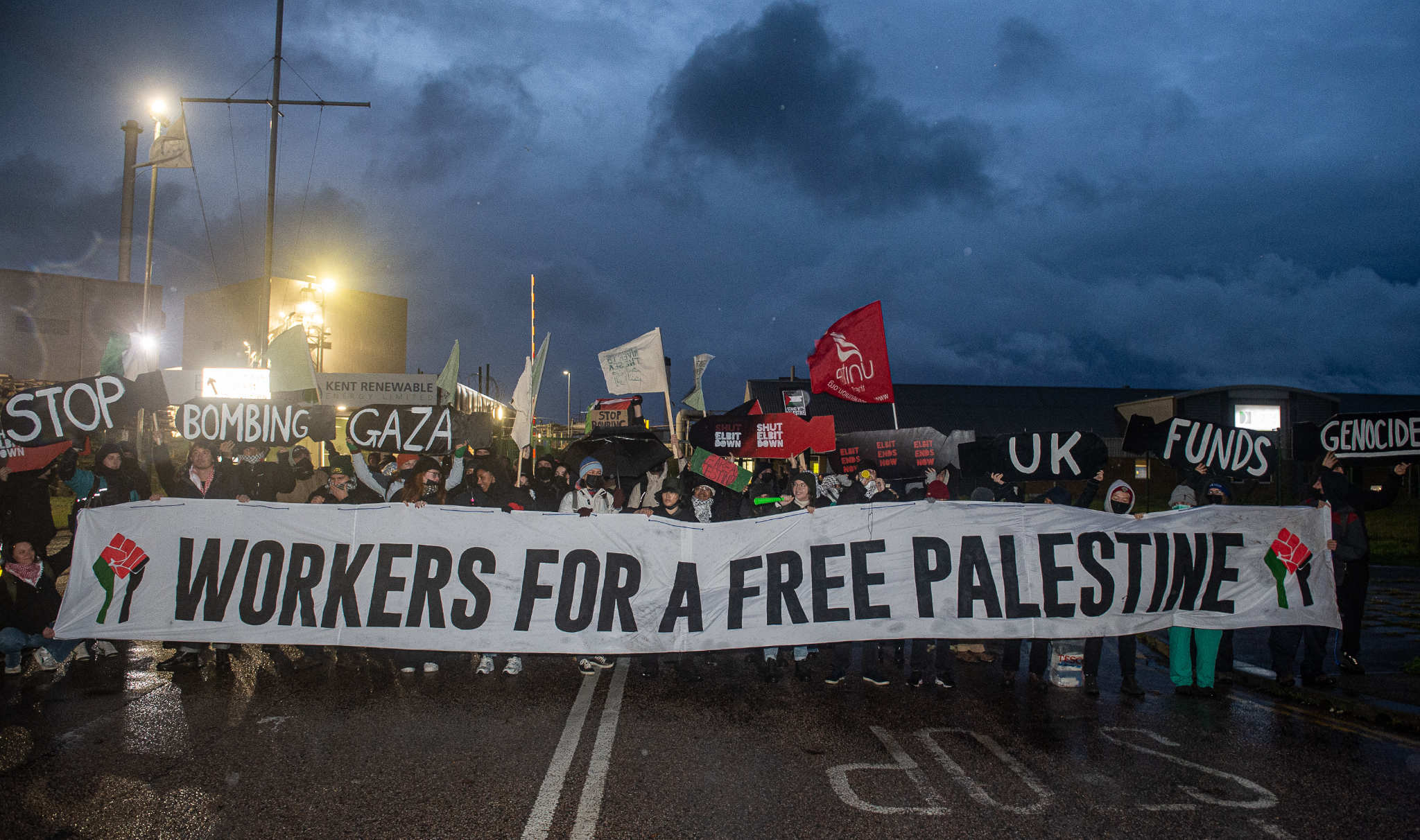During Israel’s intensified genocide of the Palestinian people, I was sitting in the dock of a court facing 11 charges for disrupting the production of weapons used to murder them.
Between the eight of us on trial, there were 35 counts on the indictment to defeat.
Whilst I was testifying in court, the prosecutor insisted that I took such action out of choice – this was not true. Yes, I took direct action out of my own free will, but there was no other viable option.
Here’s what led me to that conclusion.
Elbit Systems
For over a decade, the UK has been a safe haven for Israel’s largest weapons manufacturer, Elbit Systems.
Elbit’s business model involves manufacturing bullets, drones, combat vehicles, electronic warfare systems and missiles, using the Israeli state’s criminal attacks on Gaza as opportunities to test and develop their latest lethal inventions.
The company was born out of a need to profit from and maintain Israel’s brutal occupation of the Palestinian people.
Since 7 October, Israel has killed over 23,000 Palestinians, 9,600 of them being children, injured more than 58,000 people, destroyed over 70% of Gaza’s civil infrastructure and displaced over 1.9m people.
Elbit’s CEO Bezhalel Machlis boasted that the company is crucial to the ongoing genocide and has been thanked by the Israeli military for its services.

Missiles and drones
Those services involve Elbit providing its new ‘Iron Sting’ missiles, which leave chemical burns on killed and injured Palestinians unlike anything that doctors have seen before.
Those missiles were first used on Palestinians during Israel’s assault on Gaza in May 2021, which Elbit said was a “pre-operational test”.
Israeli pilots have also admitted using Elbit’s Hermes 450 drone to monitor and drop missiles during the ongoing operation in Gaza. The drone is often described as “the backbone of the Israeli air force”.
In 1992 Elbit formed UAV Engines at Lynn Lane, Shenstone, a factory previously owned by Norton Motorcycles. This expertise was transformed into manufacturing engines for Elbit’s Hermes 450 drone.
Failure of democratic process
Before embarking on direct action, I believed that, with facts, reason and a popular movement behind us, we would be able to shift our government and public bodies into divesting from and imposing sanctions on Israel’s apartheid regime.
That belief led me to starting the Boycott, Divestment and Sanctions (BDS) campaign at the University of Manchester, and later into researching all UK universities’ and councils’ investments into companies which profit from the colonisation of Palestine and mobilising the relevant groups to push for divestment.
During my previous job as campaigns officer at the Palestine Solidarity Campaign, I was involved in a lobby day of MPs, where locals would push their representatives to endorse a two way arms embargo on Israel.
These efforts were in conjunction with many pushing for Corbyn’s Labour party to support an arms embargo, which eventually, for the first time in political history, became a 2019 manifesto pledge.
However, all our efforts fell short of bringing about material change.
The issue wasn’t just that our pleas were falling on deaf ears – it was that we were appealing to the very institutions which were responsible for driving the colonisation of Palestine.
With the “democratic process” failing to create change, and with Elbit continuing to manufacture Israeli weapons on British soil, I was left with two options: continue with tactics which were failing or take direct action to shut Elbit down.
I, and many others, chose the latter option. That’s what led to the formation of Palestine Action and, ultimately, to me being sat in a dock for six weeks on trial in Snaresbrook Crown Court.
The Trial
The eight of us were on trial because the state wanted to brand us as criminals for occupying and defacing Elbit’s London HQ and its weapons factories in Kent, Oldham and Shenstone.
We knew that no matter what the final result was, we’d already succeeded: Palestine Action was now a global movement posing a genuine threat to Elbit’s global expansion and manufacture of weapons for Israel.
This trial was an opportunity to continue the fight within the courtroom and make it clear that we plead not guilty because Elbit is guilty, not those who act to stop them.
“We plead not guilty because Elbit is guilty, not those who act to stop them”
For the prosecution, Ofer Meishar, chief of Elbit’s global security, submitted a statement on the damage we’d caused to the firm’s UK division. Our defence team demanded Meishar come in person so we could put our questions to him.
In response, the Israeli government wrote a letter stating Meishar was of crucial importance to the Israeli government at that time and was not allowed to leave its jurisdiction. This summed up the forces we were up against.
Instead of Meishar, Paul Imm, Elbit UK’s new chief security officer, was called to give evidence in the trial. He had only been working for Elbit for nine months at this point.
Although he claimed to have little to no knowledge of what Elbit UK makes, he was insistent on distancing its operations from their owners, Elbit Systems Israel. He even went so far as to claim he had never seen Elbit’s main website: elbitsystems.com.
As my barrister, Audrey Mogan, put it in her closing speech, “even Elbit doesn’t want to be associated with Elbit”.
On the stand
Each of us took the stand to testify to why our actions against Israel’s weapons trade were justified.
Whilst he was being interrogated by the prosecutor, Robin Licker, one of my co-defendants, pulled a rubber bullet out of his pocket. He explained how that bullet, made by Elbit subsidiary IMI systems, was shot at him during a protest in Palestine.
That bullet missed him but another one shot 15 year old Mohammed Tamimi in the back of his head, leaving him in a coma for three days.
Nicola Stickels, on trial for occupying the roof of UAV Engines for three days alongside myself and three others, pointed out that our being on trial was “a joke” given Elbit’s role in an ongoing genocide.
The judge didn’t appreciate her calling out this hypocrisy and urged her to “respect the court”.
After explaining my Palestinian and Iraqi heritage on the stand, the prosecution asked me a litany of ridiculous questions.
Who were the governing body of Palestine? Who were supplying weapons to Hamas? Were Jewish students scared after I passed the BDS motion at University of Manchester?
Throughout the trial, the prosecution weaponised Israeli propaganda against us, asking if we’d thought to campaign for the rights of women and homosexuals in Palestine, what “Allahu Akbar” meant, where we drew the line and if there were “bombs on the horizon” in Palestine Action’s plans for Elbit.
Consent
Despite us all going into detail of how we were aware of our legal right to prevent a greater crime, acting to save lives and prevent the further destruction of Palestine, the judge only allowed the jury to consider our innocence based on one defence: consent.
We argued that the owners of the buildings we targeted would agree with our actions if they were aware of the full extent of Elbit’s crimes. After five weeks of evidence, the jury deliberated for a week on the different counts we faced.
In total, we were acquitted on 13 counts against us.
Richard Barnard was convicted on one count of criminal damage against Elbit’s Oldham factory after he said he didn’t believe Elbit, who owned that factory, would consent.
Shortly after delivering the guilty verdict, the jury asked if it could be changed – it could not. The jury could not come to a majority decision on the rest of the counts against us, leaving the prosecution to decide on whether they will retrial us on those charges.
Ultimately, we walked in facing varying amounts of prison time and received none. I was told if convicted on all the charges facing me I would be looking at a 4-5 year prison sentence.
Yet we all walked out as free people, and two of the eight were acquitted of all charges. An incredible result when facing the British state’s wrath for having stood on the right side of history.
Ending links
Whilst our state’s complicity in the occupation of Palestine left me with no other viable option than direct action, the personal sacrifice incurred pales in comparison to the consequences of Elbit’s weaponry being deployed against the Palestinian people.
“Our state’s complicity in the occupation of Palestine left me with no other viable option than direct action”
Not only were our actions effective in disrupting Elbit’s weapons production and building a global movement – it allowed us to expose Elbit’s crimes in court.
To top it off, three companies ended their links with Elbit during the trial. It took a two year campaign for Fisher German to end their property management of UAV Engines, two months for iO associates to stop recruiting Elbit staff and a day for Naked Creativity to end their web hosting services for Elbit’s Leicester factory.




